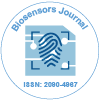Our Group organises 3000+ Global Conferenceseries Events every year across USA, Europe & Asia with support from 1000 more scientific Societies and Publishes 700+ Open Access Journals which contains over 50000 eminent personalities, reputed scientists as editorial board members.
Open Access Journals gaining more Readers and Citations
700 Journals and 15,000,000 Readers Each Journal is getting 25,000+ Readers
Indexed In
- Index Copernicus
- Google Scholar
- Genamics JournalSeek
- RefSeek
- Hamdard University
- EBSCO A-Z
- OCLC- WorldCat
Useful Links
Recommended Journals
Related Subjects
Share This Page
Electrodialysis and electrodeionization applied to remove Cr (III)
4th International Conference on Electrochemistry
Lucia Alvarado
Guanajuato University, Mexico
ScientificTracks Abstracts: Biosens J
Abstract
The development of new strategies to remove ionic metals from wastewater has been became in a global need. To design closed circuits that avoid release these compounds to the environment, from the environmental and production point of view, become each time more necessary. In this way, different kind of methods to remove metals are utilized, such as are the membranes systems. In this context, electrodialysis and electrodeionization are electrochemical process of membranes, which them have the capability to remove ionic species. This is why, both methods are available to be use as treatment of water polluted with heavy metals, without to generate wastes. In this way, the aim of the present work is to show the results of the use of these technologies applied to the remove of Trivalent Chromium from synthetic solutions, and evaluate their performance. Commercial membranes and resins were tested during the respective process in order to get advantages or disadvantages, when is used 100 or 1000 ppm Cr (III) solutions. The results presents some advantages for ED using bigger concentrations, meanwhile EDI is much better working low concentrations, spending less energy. Recent Publications 1. Alvarado L, Rodr�?guez I and Balderas P (2015) Investigation of current routes in electrodeionization system resin beds during chromium removal. Electrochimica Acta 182: 763-768. 2. Zhang Z, Liba D and Alvarado A (2014) Separation and recovery of Cr (III) and Cr (VI) using electrodeionization as an efficient approach. Separation Purification and Technology 137: 86-93. 3. Alvarado L and Chen A (2014) Electrodeionization: principles, strategies and applications. Electrochimica Acta 132:583597. 4. Alvarado L, Rodr�?guez I and Chen I (2013) Integration of ion exchange and electrodeionization as a new approach for the continuous treatment of hexavalent chromium wastewater. Separation Purification and Technology 105:55-62. 5. Alvarado L, Ram�?rez A and Rodr�?guez I (2009). Cr (VI) Removal by continuous electrodeionization: study its basic technologies. Desalination 249: 423-428.Biography
Lucía Alvarado has her expertise in Electrochemical Separation Systems which as Electrodialysis and Electrodeionization and green chemistry. She had contribute in works testing and characterizing new carbon materials and nanomaterials. The main research is designing treatment systems to remove metallic ions from wastewater and getting pure water. Currently, her adscription is as full professor in Guanajuato University, Mex., Department of Mining, Metallurgy and Geology. She is active member in the International Society of Electrochemistry and has been reviewer for Elsevier: Electrochimica Acta and Separation and Purification Technology, also reviewer of some projects for the National Council of Science of Technology in Mexico.
Email:lucia.alvarado@ugto.mx

 Spanish
Spanish  Chinese
Chinese  Russian
Russian  German
German  French
French  Japanese
Japanese  Portuguese
Portuguese  Hindi
Hindi